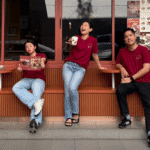
In apocalyptic TV shows and movies, survivors often celebrate when they find a stash of canned food, but have you ever wondered if it’s actually safe to eat?
Could that dusty can of beans be a bacteria bomb? Or does canned food really last forever?
To answer this question, this is where experts like Andrea Cerrato, a PhD in Food Science candidate, comes in. She’s working to ensure that canned foods and other everyday staples are not only long-lasting but also safe to consume.
Okay, but to answer the questions, yes…kind of. Canned food can remain safe indefinitely, as long as the can itself isn’t damaged. That said, its quality does decline over time. High-acid foods, such as tomatoes, are best consumed within 12 to 18 months, while low-acid foods, like meats and vegetables, can retain quality for two to five years, although they remain edible beyond that.
In a survival scenario, you’d eat whatever you could get. But in real life, food safety is a serious matter. They can be fatal and Cerrato knows the situation is only worse at poorer countries.

Cerrato attending the sixth edition of the Food Symposium, hosted by the National University of Agriculture (UNAG) in Honduras. Source: Andrea Cerrato
A PhD in Food Science is about public health
The World Health Organisation (WHO) estimates that 600 million people fall ill from contaminated food every year, leading to 420,000 deaths.
“And the impact is worse in developing countries,” Cerrato adds. “You have limited infrastructure, fewer safety regulations, less training, and less access to technology.”
That’s why she’s working directly with food companies, helping them implement proper protocols, catch potential hazards in the production line, and make safer food for everyone.
“There are a lot of cases where people get sick from canned foods, and it’s about protecting people,” she explains.

Cerrato in the lab as part of her programme. Source: Andrea Cerrato
“Even one mistake can make someone sick. You don’t want to wait until there’s a tragedy to say, ‘Maybe we should fix that.’ We have to ask ourselves, ‘Why is this happening?’, ‘Was there a production error?’, ‘Was the pH too high?’, ‘Did bacteria sneak in somewhere they shouldn’t have?’”
Her mission doesn’t end with manufacturers. Cerrato also works to educate the public — especially individuals at higher risk, such as pregnant women, young children, and the elderly — about how to safely handle food at home.
“People assume that if it’s on the supermarket shelf, it must be safe. But storage, handling, and even how you reheat food at home play a huge role in food safety,” she says.
Whether it’s teaching people how to read expiration dates, store leftovers correctly, or recognise the signs of spoilage, her goal is clear: keep people healthy through better food science.

Cerrato holds a Master’s in Nutrition and Food Sciences from Louisiana State University. Source: Andrea Cerrato
Food science: A life-saving, life-changing degree
Getting a PhD in Food Science wasn’t precisely what she had thought to pursue.
“Growing up in Honduras, there weren’t many options,” Cerrato recalls. “But one of the few available degrees was food science and technology. I didn’t even know what it was at first.”
She eventually realised that this field — a mix of biology, chemistry, engineering, and nutrition — touches every aspect of human life.
“It’s all about food, which everyone needs. You learn so much, and it impacts real people in meaningful ways,” she says.
She earned her Bachelor’s in Food Science and Technology from the Universidad Nacional de Agricultura in 2014. After graduating, she worked at Grupo Farsimán and Walmart Mexico before landing an internship in the US at Louisiana State University’s Agricultural Centre.
It changed everything.

Cerrato and her cohorts. Source: Andrea Cerrato
She attended LSU for her Master’s degree in Food Science and Technology, where she was introduced to research for the first time.
“It was tough at first, I hadn’t done any research before my master’s. But I kept learning, and I fell even more in love with food science.”
Currently at Rutgers, Cerrato is focused on completing her PhD in Food Science, acquiring advanced skills in microbial analysis, food preservation, and risk assessment.
Her long-term goal is to help bring better food safety systems to developing countries, and to keep making sure that no one has to question whether the food they eat is safe.
“There’s so much work to be done,” she says. “But if I can be part of the solution, even a small part — it’s worth it.”







